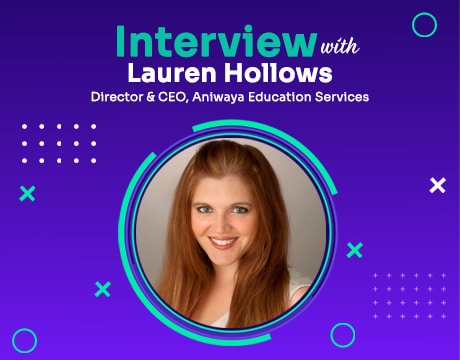BIO:
Lauren Hollows
Director & CEO
Aniwaya Education Services
Lauren Hollows is the Director of Aniwaya Education Services, a bespoke contextualised assessment provider for the VET industry. A passionate VET practitioner and educator, Lauren is best known for her regular LinkedIn contributions and videos with advice for RTOs, trainers and VET practitioners. You can find Lauren on LinkedIn, via her YouTube channel Lauren Hollows: Mum, Educator, Travelling Gypsy or at www.aniwaya.org
The following is a copy of Lauren Hollows’ interview:
What inspired you to become a vocational education and training consultant?
I don’t think anything inspired me, I like helping RTOs and found that by helping a few and being able to participate in a lot of audits, I can share the knowledge I find with more RTOs and therefore help improve the industry I love a little more.
What do you think are the key challenges associated with delivering vocational education and training?
For a trainer, dealing with students. Students are higher need than ever before, sadly our schools are failing kids by refusing to actually fail them. We have more and more students coming out of year 10, 11 and 12 who are unable to read and write. It’s not the teachers fault either, there’s too much in the curriculum and policies in place that you have to pass students even when they don’t meet the standards. Along with a range of societal issues that seem to promote fixed mindset over growth mindset and victimisation over resilience and a massive overreliance on screens, our kids, teens and now young adults are sadder, unhealthier and more lost than ever before. This translates to classrooms and training rooms across Australia.
I know so many trainers and RTOs who spend countless hours supporting students with mental health issues, justice issues, rehabilitation, drug use, etc. VET sees it all international students who have signed a lease and paid a deposit for a house that doesn’t exist because they don’t understand Australian legislation, fifteen year old kids who seem distracted in class and then tell me that they just found out their girlfriend is pregnant and worry they will be kicked out of home, young single mums fresh out of an abusive relationship who are doing a jobseeker program to try to keep a roof over their kids heads, it’s heartbreaking and humbling and it never ceases to amaze what opportunities VET can bring. However, it’s also an increasingly challenging part of VET to help and work with some of societies most vulnerable.
How do you think new technologies are changing the landscape of vocational education and training?
Great potential but mixed execution.
I love zoom, I love online training, for me personally, it’s a key way I develop myself, but it’s not for everyone and it creates more potential for some and others don’t have access, so far the have’s have benefited and the have nots have not. We need to see this change. My personal hope is that as Starlink rolls out across more of Australia, this will allow so many in remote and rural Australia to participate more in education from a student and trainer perspective. Spending the last year travelling in remote areas, I know we have a lot of talent in these areas who are limited by the fact that internet is not existent, not reliable and very expensive. Starlink has a capacity to change that and open up these regions to more easily engage in the online community and with the business opportunities that come with that.
What do you think is the future of vocational education and training in Australia?
I think we will see a tightening of regulation in light of recent events, which is likely needed, good providers shore up and we can shed some of the weak links, growth from the international market and a continued merging of the VET and HE sectors with more providers operating across both. There will always be a need for plumbers, nurses, carers, electricians, engineers, mechanics, this isn’t going away. Cybersecurity is going to be massive and this will be led by VET. Additionally, we need international education to bring in students who support growing and transient industries, hopefully we can see some tightening up of agents but I don’t hold my breath. I there are a lot of people who think VET is less than but I have two boys (9 and 15yo), both very different and they engage differently with education, both will end up in VET because it will suit them, their styles and their goals and likely with better financial prospects than if they chose a Uni pathway.
What do you think is the future of vocational education and training globally?
Growing, we see developing countries investing in apprenticeship style programs and formally developing VET systems, we see the US screaming out for more skills and less uni degrees. Australia can offer education and opportunity if our Government can get the structure right (I won’t comment on this as Labour and Liberal have been less than impressive in the last two years).
What do you think are the key issues facing vocational education and training today?
So many, but I guess they fall in a few categories:
General business challenges like finding, training and retaining good team members, it’s an incredibly difficult market at the moment for RTO roles.
Balancing red tape and quality, sometimes I see people sacrificing quality to meet compliance (less time training because more time is needed to collect evidence and assess is a good example). Other times, I see RTOs who provide great training but with no evidence collection. It’s a delicate balance.
Competing with the dodgies, most RTOs are trying to do the right thing but that’s very challenging when the majority have to compete with a minority of cowboys who are in a race to the bottom, with a consumer who may not know that a piece of paper may be ok but the skills are worth so much more. This needs a two prong attack of strong regulation and educating consumers.
How do you think we can overcome the challenges associated with vocational education and training?
Invest in VET like we invest in HE, public and private, we will need both.
Regulate consistently and fairly, start with looking at marketing of lowest cost and shortest duration providers and RPL. You offer the lowest price course or the shortest duration, your risk profile should go up.
Regulate consultants too, yearly registration with a need to prove currency of skills through participation in audits and providing sound advice and support for RTOs. Name consultants and resources providers on audit/assessment reports.
Regulate or rate agents based on completion and cancellation rates of their students. Publish the data.
Major education campaign to build awareness for students, employers.
Restructure incentives for employers and students. Small and consistent incentives for participation in training linked to progression, support and then completion not just a date please! Same with AASN’s link payments to support services.
Change the AQTF Questionnaire to seven questions. It comes from the government and the student and employer get $20 when they complete it. Anonymous but the info goes to the RTO, Regulator and STA. A summary is published on myskills and training.gov.au by RTO and course.
Did you want to enrol in the training? Yes, No, Other (Explain)
Did you gain valuable skills through your training? (1-10 No skills to Yes lots of skills)
Rate your trainer and what can you say about the quality of your trainer? (1-10 and Short answer response)
Did you have to work to achieve your qualification, did it challenge you? (1-10 Not at all to Yes very much so)
Did you get all the information that you needed about the training when you needed it? (1-10 Not at all to Yes very much so)
Would you recommend the training to others? (1-10 Not at all to Yes very much so)
What was the cost of your training?
How long did your training take?
Comments.
What do you think is the most important thing to remember when delivering vocational education and training?
You are here for them, the student, to build the skills and help them be better.
What are your top tips for aspiring vocational education and training consultants?
You are here for them, the student, in order to help students, you need to help the RTO, the trainers, the admin, the management. Don’t scare, be honest, listen a lot, read a lot, participate in as many audits as you can. Participate in at least a dozen audits and lead at least three before you even consider it. Do not call yourself a consultant unless you are happy to front an audit, have a respectful conversation with a Regulator and be able to back your opinions with evidence. Please remember, your opinion is one of many, not the be all and end all.
What services and resources do you offer to RTO clients, and how are they different from other consultants and resource providers?
Aniwaya offers bespoke assessment, highly contextualised assessment tools, clustered assessment tools, etc. We don’t do off the shelf. We do what we love and what we are good at. Check out our website www.aniwaya.org for more about what we do.











